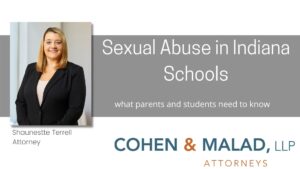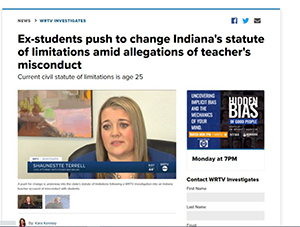Bellwether Properties, LLC, (“Bellwether”) owned property encumbered by a 10’ utility easement owned by Duke Energy, Indiana (“Duke”). Duke owned a ... Read More
FBI Investigates Sexual Abuse Claims Within New Orleans Catholic Church
By: Shaunestte Terrell, Attorney News of a federal investigation into sexual abuse claims within the Catholic Church in New Orleans has gained ... Read More
Sexual Assault: How the Burden of Proof in a Criminal Prosecution Can Affect a Civil Lawsuit
By: Amina A. Thomas, Attorney The New York Times’ Monday morning headline this week was a report on How Rape Cases Get Dropped. The article ... Read More
Sexual Abuse in Indiana Schools
VIDEO: A discussion with attorney Shaunestte Terrell Talk with Shaunestte Learn more about how Cohen & Malad, LLP's sexual abuse litigation ... Read More
Sexual Assault Statutes of Limitations: Archaic, Arbitrary, Absurd Deadlines
By: Shaunestte Terrell, Attorney Anyone who’s ever taken in an episode of Law & Order (or even Night Court back in the day) has heard that ... Read More
5 Reasons You Should Consider a Premarital Agreement
By: Nicole Makris, Attorney When marriage is on the horizon, the discussion of a premarital agreement can be an important step in planning for the ... Read More








